Do Ferrets Make Good Pets?

Ferrets are popular as pets with people looking for an alternative to more traditional dogs and cats because of their playful nature and unique personalities. Just because they might be popular doesn’t mean they are for everyone, though!
In this article, we will delve into the various aspects of owning a ferret, from their behavior and care requirements to their compatibility with different households. By the end, you’ll have a clear understanding of whether a ferret is the right pet for you!
Understanding Ferret Behavior
Ferrets are known for their playful, curious, and energetic behavior. They are intelligent animals that require mental stimulation and physical activity to stay healthy and happy. Their behavior can be compared to that of a young kitten or puppy but with a more mischievous twist. Because of this, they can be very fun to interact with, but you must be able to provide mental and physical stimulation for them or else they can develop negative behaviors.
Playful Nature
Ferrets love to play, and their antics can be highly entertaining. They enjoy chasing toys, exploring new environments, and interacting with their owners. This playful nature makes them delightful companions but also requires a commitment to regular playtime.
Social Animals
Ferrets are social creatures and often thrive in pairs or small groups. They enjoy the company of other ferrets and their human companions. If left alone for long periods, a ferret can become lonely and depressed, leading to behavioral issues.
Curiosity and Mischief
Ferrets are naturally curious and have a knack for getting into everything. They can squeeze through small spaces and are excellent escape artists. This curiosity means that ferret-proofing your home is essential to prevent them from getting into dangerous situations.

Care Requirements for Ferrets
Owning a ferret comes with specific care requirements that potential owners must consider. These include their diet, housing, health care, and grooming needs.
Dietary Needs
Ferrets are obligate carnivores, meaning they require a diet high in animal protein. A high-quality ferret kibble or raw diet is essential to meet their nutritional needs. Treats should be given sparingly and should be appropriate for ferrets.
Housing
A spacious cage is necessary for housing a ferret when not under supervision. The cage should have multiple levels, hiding spots, and enrichment items such as tunnels and hammocks. Ferrets also need daily time outside their cage to exercise and explore.
Health Care
Regular veterinary care is crucial for ferrets. They require vaccinations, dental care, and check-ups to monitor for common ferret health issues such as adrenal disease, insulinoma, and dental problems. Spaying or neutering is also recommended to prevent certain health issues and reduce odor.
Grooming
Ferrets have specific grooming needs, including regular nail trimming and ear cleaning. They also benefit from occasional baths, although too frequent bathing can dry out their skin. Ferrets have a natural musky odor, which can be managed with proper care and a clean environment.
Compatibility with Different Households
Ferrets can make excellent pets for the right households, but they are not suitable for everyone. Understanding the compatibility of ferrets with different types of households can help determine if they are a good fit for you.
Families with Children
Ferrets can be great pets for families with older children who understand how to handle and interact with them gently. However, they may not be suitable for households with very young children due to their fragile nature and the potential for rough handling.
Multi-Pet Households
Ferrets can coexist with other pets, but introductions should be done carefully. They may get along well with cats and dogs that have a calm demeanor and are used to small animals. However, ferrets should not be housed with small prey animals such as birds, rodents, or rabbits.
Apartment Dwellers
Ferrets can adapt well to apartment living as long as they have enough space to play and explore. Their cage should be spacious, and they should have daily opportunities for supervised free roaming. Noise levels from ferrets are generally low, making them suitable for apartment settings.
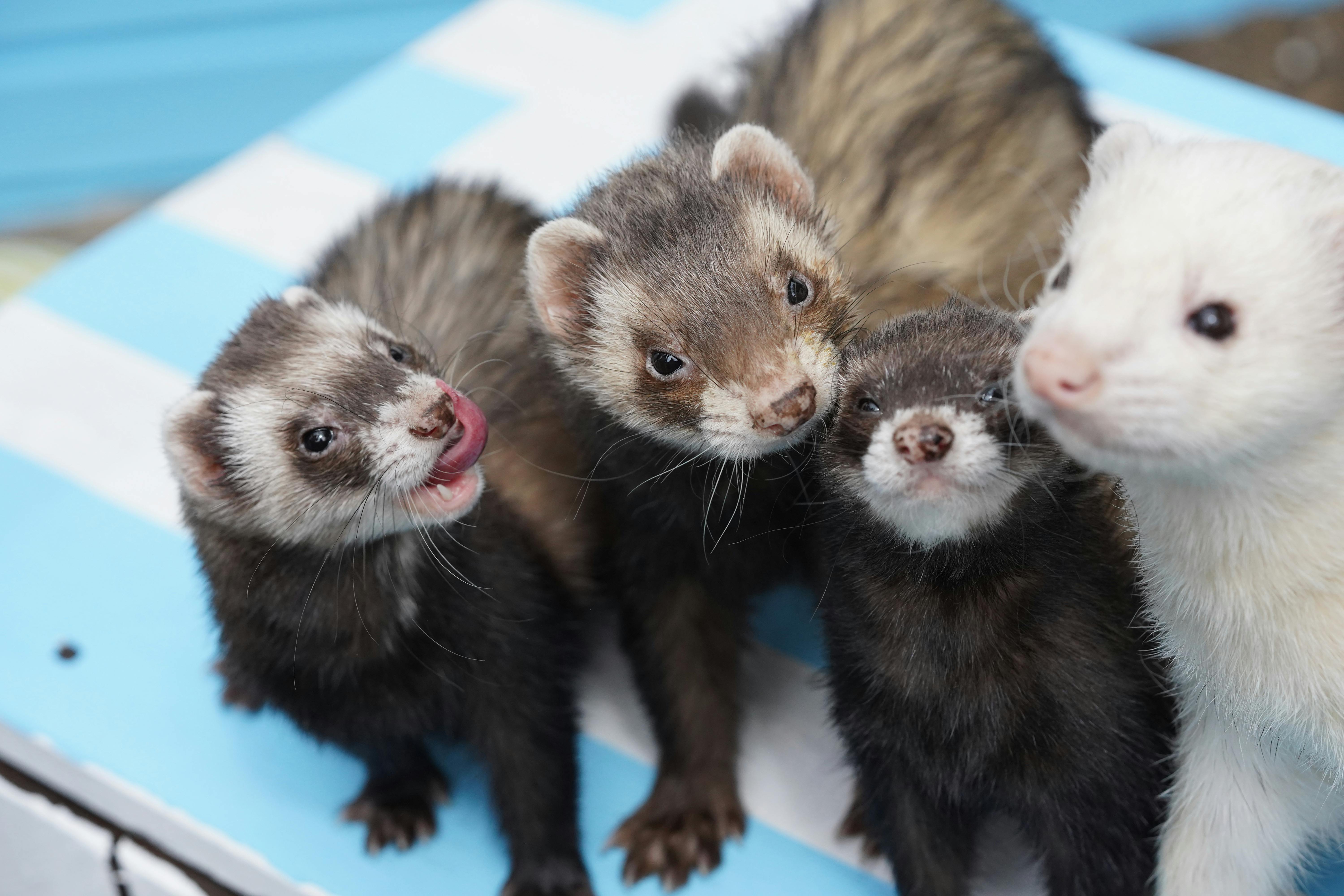
The Joys of Owning a Ferret
Ferrets can make fantastic companions. Their playful antics and affectionate nature can brighten up any home. Here are some of the key joys of owning a ferret:
Endless Entertainment
Ferrets are incredibly entertaining pets. Their playful behavior and curiosity lead to amusing and sometimes surprising antics. Watching a ferret play can provide hours of enjoyment for their owners.
Strong Bonds
Ferrets form strong bonds with their owners and can be very affectionate. They enjoy cuddling, playing, and interacting with their human companions. This bond can be very rewarding and fulfilling.
Unique Personalities
Each ferret has its own unique personality. Some are more laid-back and cuddly, while others are energetic and mischievous. Getting to know your ferret’s personality and quirks can be a fun experience for you both!
Challenges of Owning a Ferret
While ferrets can make wonderful pets, they also come with certain challenges. Prospective owners should be aware of these challenges to ensure they are prepared for ferret ownership.
Time Commitment
Ferrets require a significant time commitment for play, socialization, and care. They need daily interaction and stimulation to stay healthy and happy. This can be challenging for individuals with busy schedules.
Financial Responsibility
Owning a ferret can be costly. Expenses include high-quality food, veterinary care, cage setup, and enrichment items. Potential owners should be prepared for the financial responsibility of ferret ownership.
Behavioral Issues
Ferrets can develop behavioral issues if not properly cared for. Biting, scratching, and destructive behavior can occur if they are bored or stressed. Proper training, socialization, and enrichment are essential to prevent these issues.
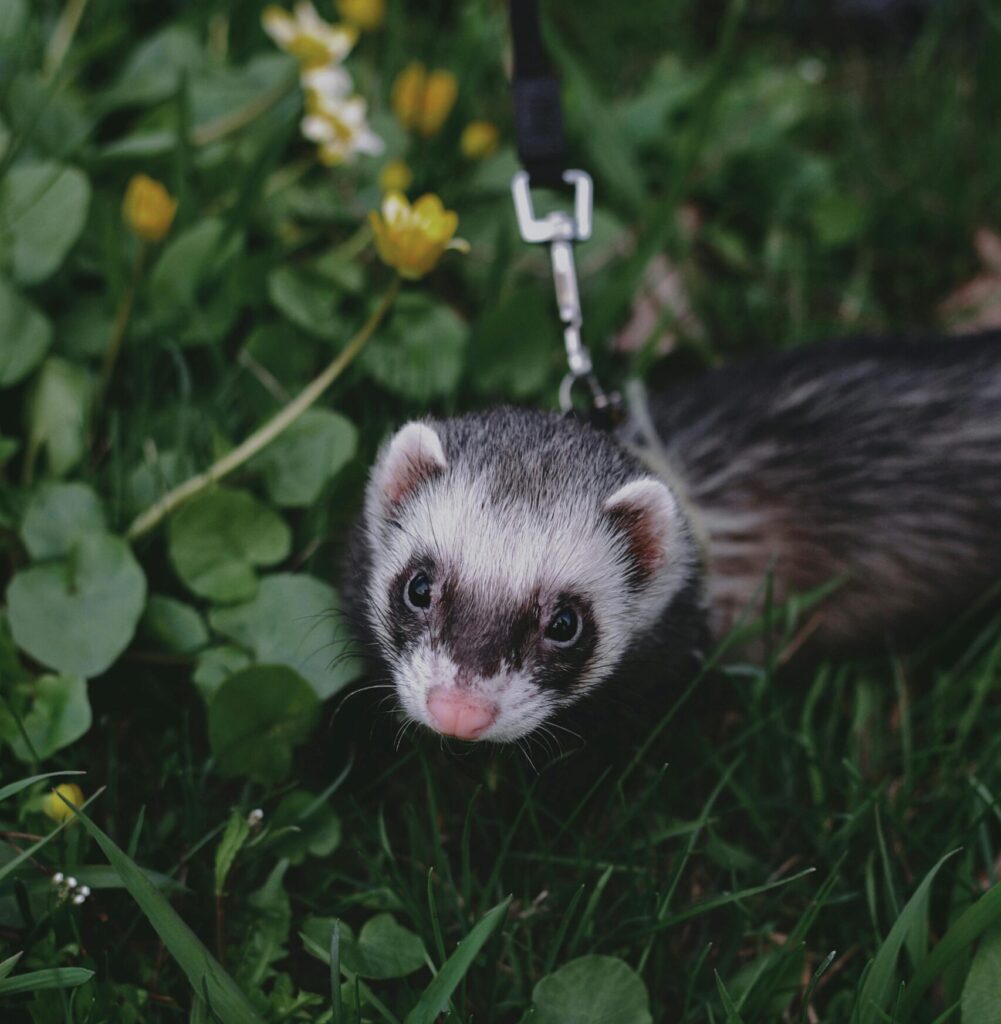
Ferret-Proofing Your Home
Ferrets are notorious for getting into everything, so ferret-proofing your home is crucial to keep them safe. Here are some tips for creating a ferret-safe environment:
Secure Small Spaces
Ferrets can squeeze through surprisingly small spaces. Ensure that any gaps or holes in your home are sealed to prevent escapes.
Remove Hazardous Items
Keep household items such as cleaning supplies, small objects, and electrical cords out of reach. Ferrets are curious and may chew on or ingest dangerous items.
Provide Safe Enrichment
Offer a variety of safe toys and enrichment items to keep your ferret entertained. This can include tunnels, balls, and interactive toys.
Training Your Ferret
Training your ferret can help prevent behavioral issues and enhance the bond between you and your pet. Here are some training tips for ferret owners:
Litter Training
Ferrets can be litter trained, similar to cats. Place a litter box in their cage and in areas where they roam. Use a ferret-safe litter and reward them when they use the box.
Bite Inhibition
Ferrets may nip or bite during play. Teaching bite inhibition involves gently discouraging biting by saying “no” and offering a toy as a distraction.
Basic Commands
Ferrets can learn basic commands such as “come” and “no.” Use positive reinforcement with treats and praise to train them. Consistency and patience are key.
Common Health Issues in Ferrets
Ferrets are prone to certain health issues that potential owners should be aware of. Regular veterinary care and monitoring can help prevent and manage these conditions.
Adrenal Disease
Adrenal disease is common in ferrets and can cause symptoms such as hair loss, weight loss, and behavioral changes. Early detection and treatment are essential.
Insulinoma
Insulinoma is a condition where tumors form in the pancreas, leading to low blood sugar levels. Symptoms include lethargy, seizures, and weight loss. Veterinary care is required to manage this condition.
Dental Problems
Ferrets can develop dental issues such as tartar buildup and gingivitis. Regular dental check-ups and proper dental care can help prevent these problems.
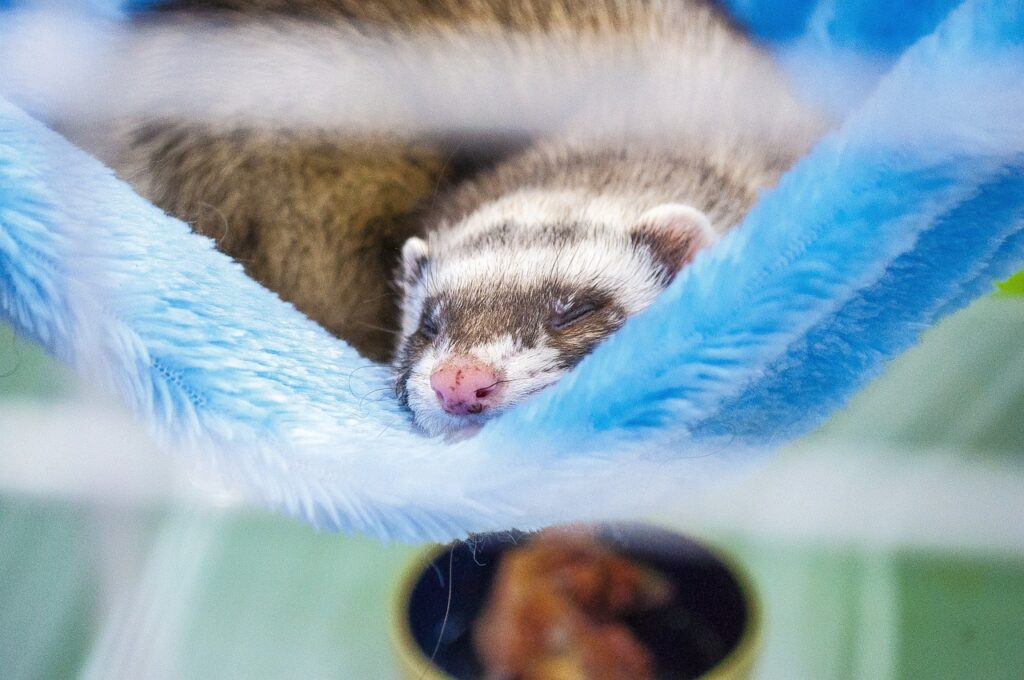
Choosing the Right Ferret
Selecting the right ferret is crucial for a successful pet-owner relationship. Consider the following factors when choosing a ferret:
Age
Decide whether you want a young ferret (kit) or an older ferret. Kits are more energetic and require more training, while older ferrets may be calmer and already trained.
Temperament
Spend time with the ferret before making a decision. Look for a ferret with a temperament that matches your lifestyle and personality.
Health
Ensure the ferret appears healthy and has been checked by a veterinarian. Look for signs of good health such as a shiny coat, clear eyes, and a healthy weight.
Ferret Adoption vs. Buying from a Breeder
Deciding whether to adopt a ferret or buy from a breeder is an important consideration. Both options have their pros and cons.
Adoption
Adopting a ferret from a rescue organization can be a rewarding experience. Many ferrets in rescues need loving homes. Adoption fees are typically lower, and the ferret may already be spayed/neutered and vaccinated.
Breeder
Buying from a reputable breeder can ensure you get a healthy ferret with a known background. However, it can be more expensive, and it’s important to research the breeder to ensure they follow ethical breeding practices.
Ferret Socialization and Interaction
Socialization is critical for a well-adjusted ferret. Proper socialization involves exposing your ferret to different environments, people, and experiences to build their confidence and reduce fear.
Early Socialization
If you have a young ferret, begin socializing them early. Gently introduce them to new people, pets, and environments. Positive reinforcement, such as treats and praise, can help them associate new experiences with positive outcomes.
Daily Interaction
Ferrets need daily interaction to stay happy and healthy. Spend time playing, cuddling, and engaging in activities that stimulate their minds. This interaction helps strengthen your bond and keeps your ferret mentally and physically active.
Handling Tips
When handling your ferret, always be gentle. Support their body and avoid sudden movements that might startle them. Regular, gentle handling from a young age can help your ferret become comfortable with being held.
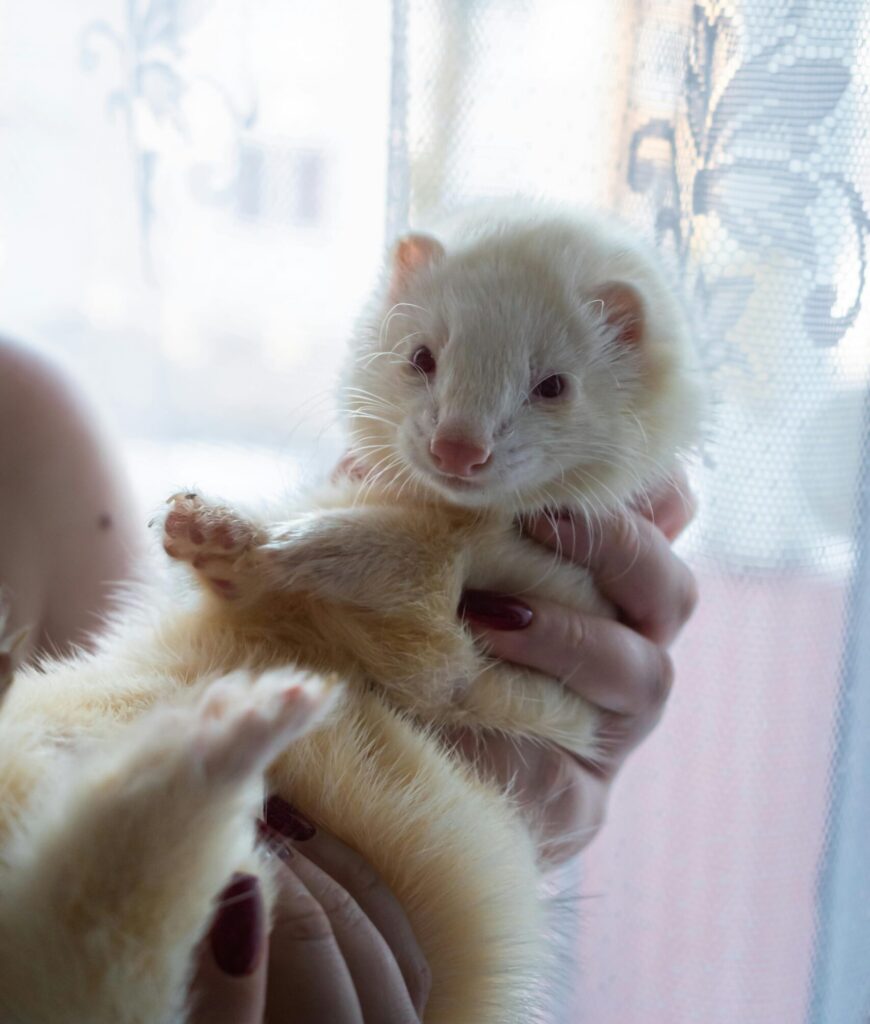
Enrichment and Mental Stimulation
Providing mental stimulation and enrichment is vital for a ferret’s well-being. Boredom can lead to destructive behavior and health issues, so it’s important to keep your ferret engaged.
Toys and Activities
Ferrets enjoy a variety of toys, including tunnels, balls, and puzzle feeders. Rotate toys regularly to keep them interesting. Interactive play, such as fetch or hide-and-seek, can also provide valuable mental stimulation.
Environmental Enrichment
Create a stimulating environment for your ferret with hiding spots, climbing structures, and tunnels. Changing their environment periodically can keep them curious and engaged.
Training Games
Incorporate training games into your ferret’s routine. Teach them tricks like roll over or fetch using positive reinforcement. These activities not only stimulate their minds but also strengthen the bond between you and your pet.
Understanding Ferret Communication
Ferrets communicate through a variety of sounds and body language. Understanding their communication can help you better meet their needs and recognize when something is wrong.
Vocalizations
Ferrets make several sounds, including:
- Dooking: A happy, excited chuckling sound often made during play.
- Hissing: Indicates fear or displeasure.
- Screeching: A sign of pain or extreme distress.
Body Language
Ferrets also communicate through body language. Some common behaviors include:
- Arching Back and Hopping: Known as the “weasel war dance,” this playful behavior indicates excitement.
- Puffing Up Tail: Shows fear or agitation.
- Laying Flat: Can indicate relaxation or submission, but also fear if accompanied by hissing.

Ferret Health Maintenance
Maintaining your ferret’s health requires regular care and attention. Here are some key aspects of ferret health maintenance:
Regular Check-Ups
Schedule regular veterinary check-ups to monitor your ferret’s health. Early detection of health issues can lead to more effective treatment.
Vaccinations
Ferrets need vaccinations to protect against diseases such as distemper and rabies. Consult your veterinarian for a vaccination schedule.
Parasite Control
Ferrets can be susceptible to parasites like fleas and ear mites. Regularly check for signs of parasites and consult your vet for preventive treatments.
Spaying/Neutering
Spaying or neutering your ferret can prevent certain health issues and reduce unwanted behaviors. Discuss the best timing for this procedure with your vet.
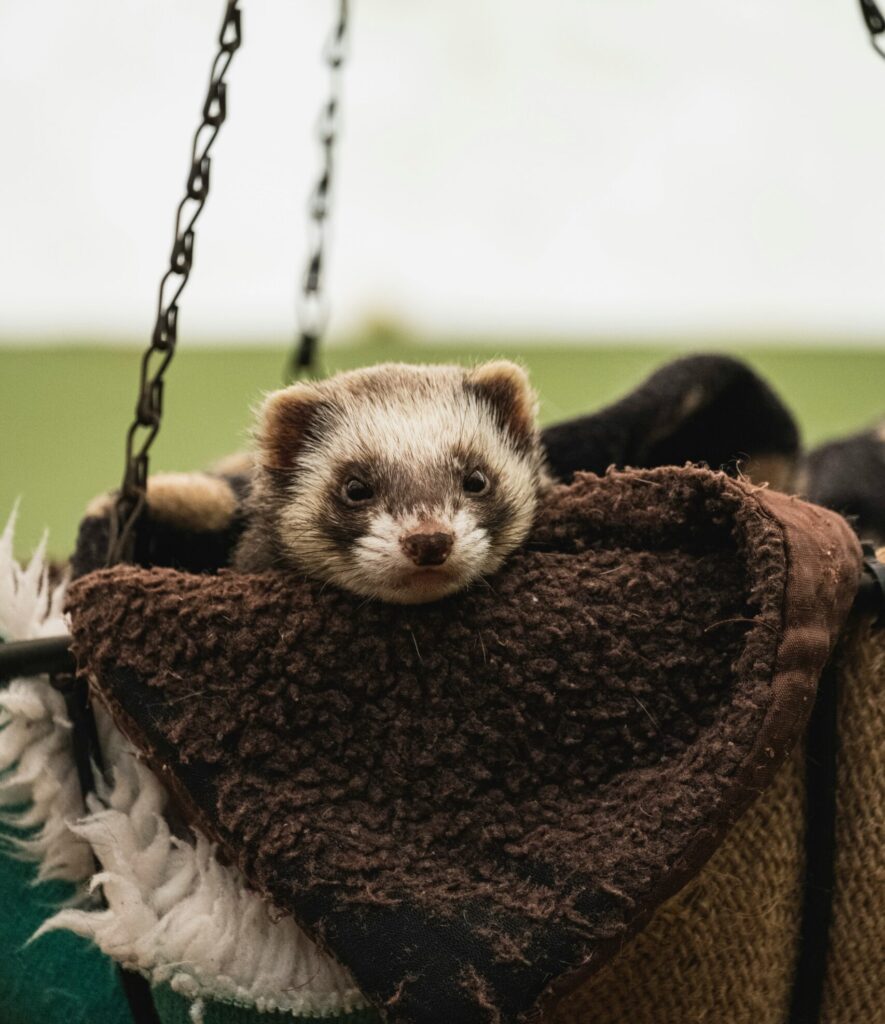
Traveling with Your Ferret
Traveling with a ferret requires preparation to ensure their safety and comfort. Here are some tips for traveling with your ferret:
Carrier Safety
Use a secure, well-ventilated carrier for your ferret. Line it with a soft blanket and include a familiar toy to make them feel comfortable.
Travel Essentials
Bring along essentials such as food, water, a litter box, and cleaning supplies. Make sure to pack enough supplies for the duration of your trip.
Stress Management
Travel can be stressful for ferrets. Minimize stress by keeping their carrier covered during travel to reduce visual stimuli. Offer treats and comfort items to help them relax.
Ferret-Friendly Housing Setup
Creating a ferret-friendly housing setup is essential for their health and happiness. Here are some key components of a good ferret habitat:
Spacious Cage
A spacious cage with multiple levels provides room for your ferret to explore and play. Include platforms, ramps, and hammocks for enrichment.
Comfortable Bedding
Provide soft, washable bedding for your ferret. Avoid materials that can unravel or be ingested, such as loose fibers.
Enrichment Items
Include a variety of enrichment items such as tunnels, hideaways, and chew toys. Rotate these items regularly to keep your ferret engaged.
Ferret Bonding and Interaction
Bonding with your ferret takes time and patience. Here are some tips to strengthen your relationship with your pet:
Consistency
Consistency in interaction and care helps build trust with your ferret. Establish a routine for feeding, playtime, and handling.
Positive Reinforcement
Use positive reinforcement, such as treats and praise, to reward good behavior and encourage bonding. Avoid punishment, as it can damage your relationship.
Respect Boundaries
Respect your ferret’s boundaries and give them space when needed. Forcing interaction can lead to fear and mistrust.

Understanding Ferret Life Stages
Ferrets go through different life stages, each with specific care needs. Understanding these stages can help you provide the best care for your ferret.
Kit Stage (0-1 Year)
Kits are energetic and require plenty of play and socialization. They also need training and consistent care to develop good habits.
Adult Stage (1-5 Years)
Adult ferrets are typically more settled but still require regular play and mental stimulation. Health monitoring and veterinary care are important during this stage.
Senior Stage (5+ Years)
Senior ferrets may become less active and more prone to health issues. Regular vet check-ups and a comfortable, accessible environment are crucial for their well-being.
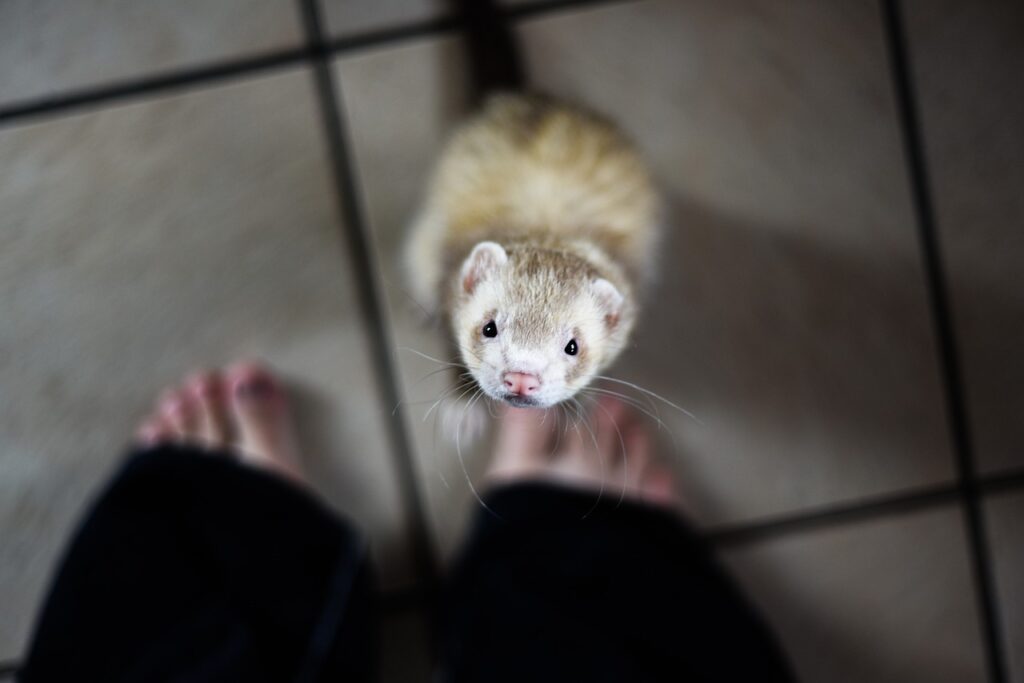
Frequently Asked Questions
Are ferrets good pets for first-time pet owners?
Ferrets can be suitable for first-time pet owners who are willing to invest the time and effort required for their care. It’s essential to research and understand their needs before bringing one home.
Do ferrets get along with other pets?
Ferrets can get along with other pets such as cats and dogs if introduced properly. However, they should not be housed with small prey animals like birds or rodents.
How much does it cost to own a ferret?
The cost of owning a ferret includes initial setup (cage, bedding, toys), ongoing expenses (food, litter), and veterinary care. It can range from $300 to $800 annually, not including emergency vet visits.
Do ferrets require a lot of attention?
Yes, ferrets require daily interaction, playtime, and mental stimulation. They are social animals and can become bored and lonely if not given enough attention.
How long do ferrets live?
Ferrets have a lifespan of 6 to 10 years, with proper care. Regular veterinary check-ups and a healthy diet can help ensure a longer, healthier life.
Are ferrets high maintenance?
Ferrets are considered high-maintenance pets due to their specific dietary, housing, and social needs. Potential owners should be prepared for the commitment involved in ferret care.

Conclusion
Ferrets can make wonderful pets for the right owner. Their playful, affectionate nature and unique personalities can bring joy and companionship. However, they also come with specific care requirements and challenges that potential owners must consider.
By understanding ferret behavior, care needs, and compatibility with your household, you can make an informed decision about whether a ferret is the right pet for you.
